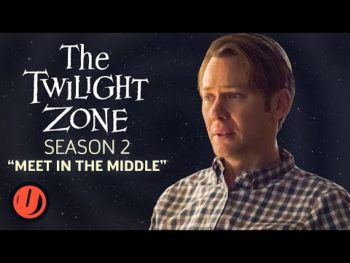Jordan Peele’s Twilight Zone Newest Season Executes like Modern Day Parables
Over a month ago, I spoke about the uniqueness of Jordan Peele’s Twilight Zone. In its sophomoric season, we find the episodes are geared more toward exploring universal pain. To illustrate, I’ll highlight three episodes, noting the ‘tip of the iceberg’ storyline in all its speculative glory and then the deeper ‘beneath the surface’ pain.
Season 2, Episode 1: Meet in the Middle (Is the voice in his head real?)
Tip of the iceberg: Our awkward store manager Phil played wonderfully by Jimmi Simpson, is understandably freaked out when he hears a woman’s voice in his head during a terrible date. As we travel with him on his journey through the extraordinary, Phil begins to spend more time with ‘Annie’. Over time, he accepts her intrusion into his mental space, sure that he isn’t going crazy, but that ‘Annie’ is a real person. He begins to go on ‘dates’ with her. Several scenes show him sitting along at a restaurant laughing and smile with her, getting an ice cream cone with two spoons, or walking by himself, fully engrossed in his world and the relationship he has with her.
Until he uncovers a devastating lie. It changes the course of their relationship and onto a twisted conclusion.

Image copyright: CBS
Beneath the surface: This episode was a good strong start for the season. I found it a personification of the virtual world and how relationships are sometimes formed on a one-dimensional plane. Two users who meet and interact solely on a virtual plane (i. e., social media). In the show, Phil and Annie are only connected by the fact they can hear each other’s voices in their heads. He can’t see her, and she forbids him to look her up online. Over time, this relationship he has with Annie becomes more important than anything outside of it.
There’s a scene where he and she are talking. The background is particularly beautiful with snow and soft lights, but he’s not even paying attention to it…just talking to the voice in his head.
I sort of saw the twist coming a few times, but I liked the fact I was kept guessing. Was he crazy? Is this woman real? Is it a dis-associative personality?
Phil’s character was illustrative of the growing isolation we’ve put ourselves in when we act and limit all interaction to just one plane – social media.
Season 2, Episode 1 Eight (Eight Brains vs Eight Brains)
Tip of the Iceberg: This episode is one of two creature stories. I looked forward to this because of my automatic love for monsters and was excited to see this explored. In this episodes, eight scientists from different countries are looking for a new species of octopus.
But why? Is it just for study or for a more nefarious reason? When they encounter this octopus, the tables are switched – whom exactly is stalking whom?
Beneath the surface: I liked this episode because it illustrates that although we humans are the head honchos on the planet, it doesn’t mean we’re the only smart ones. Yes, I believe we have dominion over the Earth and are called by God to be good stewards. That doesn’t mean we should try to dominate everything without regards to its life.

Researchers studying octopus on the Twilight Zone… Image copyright: CBS
The octopus is highly intelligent. In one scene, you see it watching the scientist with as a dispassionate glance as we would to it.
Evolutionary theory is often the crux for the reason of the shift of power. Although I don’t believe in evolution, most secular sci-fi utilizes the theory to explain away stuff without having to think it through. Sort of like “God of the Gaps” theory. Instead, we have “Evolution of the Gaps” theory.
Evolution did it! That’s all we need to know! Really? eyeroll
The more we learn about the animal kingdom, we find out that there are no such things as dumb animals. I saw this as a message of dominance vs stewardship and the dangerous pitfalls of thinking dominion equals subjugation.
Season 2, Episode 10 You May Also Like (After These Messages)
Tip of the Iceberg: A woman with everything finds out she really has nothing.
A commercial of a young girl traveling through the woods with a broken, naked doll fills the screen. A voiceover claims, “Get the EGG for your family and everything will be okay. Okay forever.
We follow a housewife who wakes up on a bed with no memory of how she got there. Talking to her neighbor she tells her that she loses time after she hears musical chords and then, she’s back on the bed. This happens at regular intervals.
While this is happening, everyone is excited about getting their ‘EGG’. No one, not even our housewife, knows what the EGG is but EVERYONE must have it. There’s speculation as to what it will do. Throughout this narrative, we learn that the housewife with everything doesn’t have one thing. It’s the catalyst of the show and to reveal it would be to reveal the big spoiler.

One of the characters in “You Might Also Like.” Image copyright: CBS
Beneath the surface: This show clearly indicates that people are never satisfied with what they have. They are always searching for something more. The EGG – due to great advertising, everyone is getting one. They’re voracious for it. When another housewife comes onto the scene with her EGG, our housewife asks to see it. She’s vehemently denied.
An aspect of this episode showed also how advertising reflects the human mind. Our housewives all wear similar clothes, have similar houses, even similar cars. It’s Keeping Up with the Joneses to the umpteenth power.
Choosing a focus: character development or plot execution
Overall, this season had a disjointed feel to it. This does not mean I didn’t enjoy it, but I felt that decisions were made behind the scenes that made for an average implementation as opposed to the sublime experience of the first season.
The second season, obviously, was given more money for production as we had more instances of CG. I don’t think the added CG served the season well. In the episodes I chose to highlight, the first one, “Meet in the Middle”, had an even balance of both character development and plot execution. It should be noted that this episode, as far as I could tell, had no CG in it.
In “Eight”, I was glad to see indie horror filmmakers Justin Benson and Aaron Moorehead (“Spring,” “Resolution”, and “The Endless”) direct this episode. However, due to time constraints, the episode lacked their brilliant subtleties in the horror genre. In my opinion, they had to choose between character development or plot execution. They chose the latter, which led to our being disassociated with our cast. The cast only served as exposition so when the octopus chokes one guy, who cares?
My least favorite of the season was “You May Also Like”. I’ll be frank. It irritated me. The story was extremely fractured. I’m all for red herrings but geez! It took me watching it twice to understand that the format was an intentional thing. Plus, the end of this one has a more nihilistic overtone which I did not enjoy. More on this in a minute.
Whereas the first season told a single story in bits, this second season was all over this place. I’m in the process of re-watching it so I can plug in the parts with the holes that add to the overall story.
Nihilism versus solutions: the parables of Christ
I should begin with stating that I am enjoying this revitalization of the Twilight Zone. A critique simply points out the positives and the negatives. However, I noticed this season tangoed a lot with nihilistic thought.
The Twilight Zone’s legacy focuses on extraordinary things happening to ordinary people. Not every episode in the original series had a bad ending. Some ended well. Others didn’t. In every episode of season 2 of this revitalization, there’s this lingering sense of nihilism.
As a refresher: nihilism: the rejection of all religious and moral principles, in the belief that life is meaningless.
With this as a foundation, the twists are often dark. There’s no glimmering light. It doesn’t matter that horrible things happened – it happened, it’s predetermined, deal with it.
In old sci-fi stories, it used to be more about the adventure of discovery, pitting man against the unknown foe and succeeding. Modern sci-fi focuses on the unknown that essentially overwhelms us, and we cannot fight. We merely succumb to our human frailty. There is no one to save us. So, although the multi-layered storylines are woven into the narrative, there is no hope. All our efforts for success are meaningless.
Contrast this with the parables of Christ. Jesus Christ used storytelling to reveal spiritual things, to warn of one’s choices and to present solutions, just to name a few.
In the parable of the rich man and Lazarus, the rich man had a choice to help Lazarus, but chose not to. He had multiple opportunities from what we can infer. Lazarus was the one left out in the cold. However, this parable shows us that when man ignores us, God watches and intervenes. When Lazarus died, he was taken to the bosom of Abraham. When the rich man died, he lifted his eyes in hell and torment. Could things have been different if he had answered the call of Lazarus’s needs?
In the parable of unmerciful servant, Christ uses this to illustrate the need for forgiveness. Again, the servant who owed ten thousand talents, who, after he had been shown mercy by the king, chose to not reciprocate. I mean, he choked the guy who owed him a hundred pence and threw him in jail. If this were the Twilight Zone, the episode would have ended here. But the King, when he heard about it, intervened in judgement. Again, showing the need for a savior. The solution is presented – forgiveness.

The Good Samaritan by Vincent Van Gogh
Probably one of the most famous, the parable of the good Samaritan, Christ illustrates who our true neighbors are. When the man is left for dead by robbers and ignored by the legalistic religious folks, the ‘sinner’ is the one who cares for him. Again, in a nihilistic view, the man who had been left for dead would have died, his life having no meaning. In the person of the Samaritan, we see once more the need for a savior.
Why this fixation on Savior? Glad you asked! Christ did not let us continue to wallow in our sinful nature. As I mentioned last month, he didn’t just narrate the events or point out the problem, He actively entered our sinful world and provided a solution through His blood. We don’t have to stay trapped. We can escape if we so choose to accept His gift of salvation.
In closing, The Twilight Zone continues the tradition of presenting a multi-layered story but not a solution to the hard questions of life. Christ has, is, and always will give us a solution. It may not be the one we want, but it’s the one that leads us out of The Twilight Zone.






























Excellent article, Parker.
Thank you so much!!!!
Sounds very interesting.
The parallel you made with social media and Meet In The Middle’s scenario made me think of AI as well. Some day AI will get to the place where someone could go online and think they’re arguing with a person…but that person is actually just an artificial intelligence. Even if that exact scenario doesn’t play out, AI will still offer that situation of wondering whether we are talking to/interacting with something that’s real. Heck, it’ll even get to the point where we can’t entirely trust video recordings since AI will greatly improve the quality of deep fakes. Voice synthesization has already made a lot of progress.
I like a variety of stories, with some presenting a solution and others utilizing a more negative nihilism to make a point or illustrates something but leaves the conclusion more open ended. (A story that follows hopeful nihilism might actually present solutions though. Maybe.) Both types of stories do seem to have their place and use. Then again…I dunno, some of the nihilistic looking stories actually might have solutions built in as well, they may just be harder to spot since the solutions might be implied a lot more vaguely.
Have you seen Black Mirror? I haven’t seen that show, or Twilight Zone, but it sounds like they’re similar in concept. If you have seen Black Mirror, what’s your opinion of it?
Thanks so much for responding. I LOVE Black Mirror. The only episode I didn’t watch was the first one and that was because it had bestiality in it and whereas I’m pretty wide in my tastes, I do have to draw the line SOMEWHERE. Black Mirror’s focus though is on the material. Nothing supernatural. At least from the last time I’ve seen it I should say.
The show often depicting the dark side of AI, which is a Western construct. As you mentioned, AI is getting very good at deep fakes and don’t think the videos coming closer to the election aren’t going to be made up of deep fakes.
My favorite episode is the play off Star Trek they did. It was brilliant. I mean absolutely brilliant. Dark and gritty but still carried that moral code to it. You made a point that I hadn’t considered when you said that some nihilistic stories may have solutions and even morals built into them. I am going to simmer on that for a moment because then i have to wonder if there is a moral code embedded at all, then can it be nihilistic? That has me thinking and I thank you for giving me the thought.
Sounds like Black Mirror is pretty cool, then 🙂 I like the idea of having some shows in this style that focus more on the supernatural (Twilight Zone, I guess) and some that focus more on the natural with Black Mirror. Some day I’ll probably see these. For now I guess I’m somewhat experiencing them vicariously through your articles until I get around to the actual shows XD.
And cool 🙂 From what I’ve gathered from nihilism (or at least hopeful nihilism) there can be a moral code, it’s just human, society, individual, etc based, rather than there being a moral code passed onto us by God or embedded in the universe or whatever. So one angle you might enjoy considering is what people look to as far as their source goes, and how that influences outlook, behavior, society, etc. And then I guess a nihilistic story might not be moral in and of itself, but portray chars that have moral beliefs/codes they want to follow. So I guess there’s a lot of fun in and outs to it.
I love how you broke this down. I enjoy the old Twilight Zone and haven’t picked up the new one (ok, I didn’t know it existed), but now I’m going to be watching it, new and old, and thinking about it as you do. Thanks!